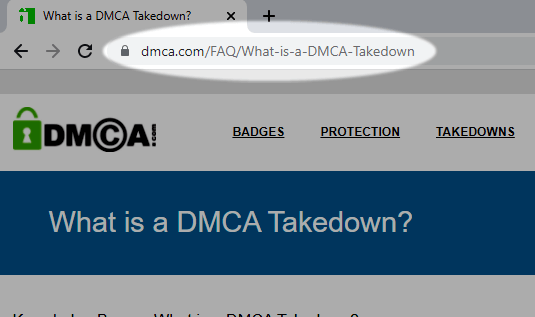
If someone has stolen content from your website and is hosting it somewhere else without your permission, DMCA.com can help. Go to: Takedown and complete the form.
Simply submit the name / URL HTTP link location of where you found your stolen work and DMCA.com can go to work on your behalf.
There has been a rapid increase of popular websites being copied verbatim and re-hosted elsewhere to capitalize on Google search engine traffic. DMCA.com has helped many clients where this has happened, register now and DMCA.com will help.
Some examples of stolen content website content that the takedown team works with everyday are:
- Pictures - either of you or taken by you
- Videos - of you or taken by you
- Graphics
- Text
- Applications
- Programs
- Profiles or Bio's - personal or corporate
- and many more
If one of these examples is like your situation, DMCA.com can help.
- Go to: Takedown and complete the form.
- Swear the content is yours by checking the appropriate box on the DMCA form.
You can also submit a question regarding your takedown or case here: Ask a question.
DMCA.com Fast Tip
Often the first sign of stolen website content is a drop on Google page ranking. Where your website may have dropped from page 1 to 2 or 22.
Copied content can negatively impact search results
The unfortunate reality is that website content theft has become a widespread issue. Imagine waking up one day to find that your hard-earned content has been copied without your permission.
When someone steals your website content, it not only undermines your hard work but can also harm your online presence. You may notice a significant impact on your search engine rankings and visibility. As search engines prioritize originality, the presence of duplicated content can negatively affect your website's performance.
Steps to reclaim stolen content, combat copyright infringement, and protect intellectual property
Monitoring
To stay proactive in protecting your content, leveraging technology is crucial. DMCA.com's Monitoring service can locate infringements for you using relevant keywords and phrases to receive notifications whenever your content is detected elsewhere.
Create an account to get started with monitoring.
Gathering Evidence: Documenting the Offense
- Collect proof of copyright infringement from the offending website, including timestamps and evidence of ownership.
- Take screenshots, download copied content, and document website URLs.
Three main pieces of information are needed to get started filing a DMCA copyright notice:
1. Infringing URL

Where on the internet is your stolen content located? What is the link that you want the content removed from? Be sure to provide the URL or website/webpage link of the content you want removed. If the stolen content is an image or video located on a website provide the direct link of the content contained in the site. Copy and paste the infringing text, or provide the URL of the infringing image if required.
An example link would look like: https://www.badguy_site.com/webpage/image_2

2. Source URL
Where was your content located when it was stolen? Was it on your social media profile? Was it from your own website? Provide the exact URL where it was stolen from, even if the content has already been removed from its original location. The original URL is still valuable to the notice. If it was not online you can reference cell phone, computer, or camera etc. If it was online such as a website or cloud storage provide the link to the exact page it was stolen from. You can upload the original content to a cloud storage service and provide that URL with an explanation of where it was originally stolen from.
An example link would look like: https://share.icloud.com/photos/my_original_content
3. Description of Ownership

What is the content owner's name and how was the content stolen? How is this content yours? How do you own it? Did you create it, buy it, copyright it? Who is claiming ownership of the content? Who is authorized to file the DMCA Takedown? When did you create the content and when was the content stolen?
An example description would sound like: "My photo I took of myself on my camera was stolen from my Google Drive and was posted on this website without my knowledge and I would like it removed."
DMCA.com specializes in removal of stolen website content
The Professional Takedown Team at DMCA.com can help with the answers. Click here to submit the content form and ask us about your situation.
Strengthening Future Protection: Technical Measures
Prevention is key. Taking steps to avoid copyright infringement in the first place is the best measure of protection.
- Protect your pages with DMCA.com's Protection Pro.
- Implement security measures like content encryption and DMCA.com's watermarker.
- Restrict access to sensitive information through user permissions.
- Register your website content with relevant copyright authorities.
DMCA.com Testimonial
I was shocked to find out how easy it was to copy our website. I was extremely angry that someone could do this to us. I found DMCA.COM after doing a google search and chose them over others, as they seemed to be the most professional. They exceeded my expectations and got the site taken down in 4 days! I have had a really positive experience with them and they delivered. If you have the same issue then I would highly recommend them.
Who can filetakedowns of stolen website content?
- content creators/owners
- social media users and participants
- content publishers or distributors (with permission of the content or copyright owners)
- copyright owners
- code writers and publishers
- NFT owners
- subject contained within the content and published without permission (special considerations may be required)
If the list above does not appear to describe your situation, ask us! Click here to Ask us about your situation
Which countries use DMCA to remove stolen website content?
While the DMCA is part of USA Copyright Law. The DMCA Takedown process described within the law is widely used throughout the world. Most countries accept the standard DMCA Takedown Notice form and process. Although the DMCA Takedown is part of US Copyright law, a DMCA Takedown Notice is often used and accepted throughout the world and not exclusive to the United States. However, many countries have their own copyright laws specifically related to the removal of stolen website content from internet service providers and site owners within their borders. Which service providers do and do not accept the standard DMCA takedown notice form and process is dynamic and constantly changing. DMCA.com professionals are aware of these constant changes and are able to convert the information submitted through the standard DMCA Takedown signup form to suit specific countries and/or service providers within the legal process they require.
How can DMCA.com help Protect to my website?
DMCA.com's first recommendation is to contact a lawyer or law firm in the legal jurisdiction of your company or website to determine what is the appropriate legal communication. DMCA.com does not offer any legal advice or specific recommendation regarding any copyright practice.
DMCA.com has two programs to help content creators, publishers and UGC platforms:
- Content Creators and Publishers (without UGC) should use DMCA.com Protection Pro - Content Protection - it is essential to add an ownership statement to all your content. Registering and adding your content and website to this program is click through easy. There is even a Free program so getting started is easy.
- Content Publishers or Platforms of User Generated Content (UGC) should use the DMCA Compliance program - Get Compliant - adding a compliance badge to your site instantly takes the guess work and time out of processing DMCA Takedown notices on your site.
Related DMCA Takedown FAQ's
- What is DMCA Protection
- What is a DMCA Takedown
- What is DMCA.com
- What is Google De-Index
- What is Trademark vs Copyright